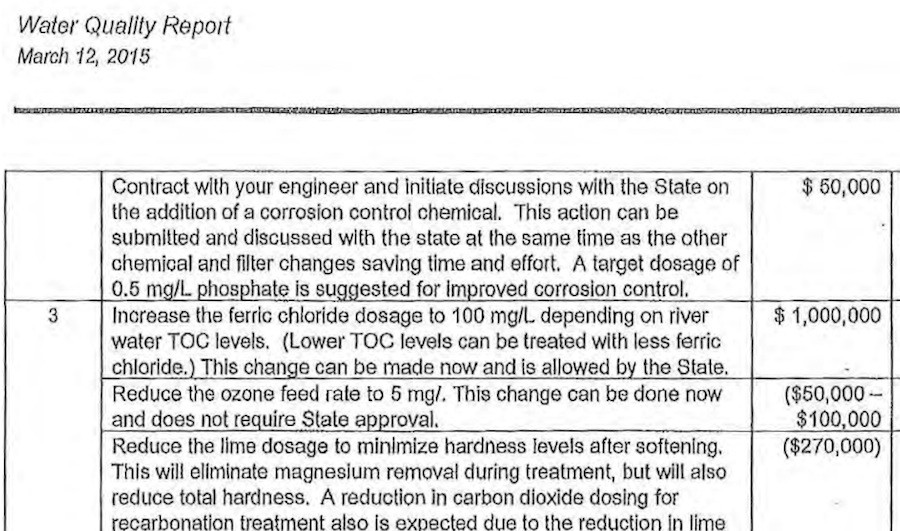A report completed last March for Flint, Michigan's emergency manager contained recommendations to inhibit pipe corrosion that has been blamed for high levels of lead in the city's water supply.
The report did not specifically mention the possibility of lead poisoning, documents released by the state show.
Written by Chicago-based Veolia North America, a unit of the global water giant, the report said the measure would cost $50,000. The suggestion was part of a long list of ideas, and most of the text dealt with other potential toxins and with taste and odor. Flint city officials saw a preliminary version of the report last February, and the full report had been posted on the city's website shortly afterward.
According to a story that appeared Jan. 21 in the Detroit Free Press, the report's recommendation constituted a missed opportunity that possibly could have averted or diminished the city's crisis over elevated levels of lead leaching into the drinking water system.
President Obama told mayors attending the U.S. Conference of Mayors meeting in Washington Jan. 21 that Michigan would receive $80 million to help pay for water infrastructure improvements, including in the city of Flint, which is scrambling to address the crisis.
Obama called the situation “inexcusable” and added, “Our children should not have to be worried about the water that they’re drinking in American cities. That’s not something that we should accept.”
As the crisis has unfolded, two Michigan Dept. of Environmental Quality officials resigned in late December, and on Jan. 22, the U.S. Environmental Protection Agency Administrator Gina McCarthy accepted the resignation of Region 5 administrator Susan Hedman as well. Additionally, a Justice Dept. probe has been launched.
Switched Water Sources
The city, under the authority of a state-appointed emergency manager, switched its drinking water source from Detroit’s Lake Huron to the Flint River as a cost-cutting move in 2014. A new pipeline is being built to provide water from Lake Huron to mid-county residents, including Flint, but that project won’t be complete until this summer. While a new pipeline will help, the entire system needs to be upgraded, according to several sources.
Because proper corrosion controls were not used, the service lines leading up to homes, some of which are antiquated lead lines, have been destroyed, the sources say, and even clean water could become tainted. At the mayors' meeting, Flint Mayor Karen Weaver noted that many of the service lines to local homes are lead lines, and need to be replaced.
“This is #1 a public health issue, and #2, an infrastructure issue,” she told reporters. Gov. Rick Snyder (R) has been widely criticized for his handling of the crisis. In a Jan. 19 annual state-of-the-state speech, he apologized to the people of Flint and said, “I will fix it.” He also promised resources “to anyone and everyone who has been affected.”
He released thousands of emails related to public concerns and local EPA officials responses to growing concerns about water quality issues in Flint.
Report Cites Cast Iron Pipes
As part of that release, Veolia's March 2015 report to the city’s emergency manager, Gerald Ambrose, recommended that the city add at least $50,000 in corrosion controls to reduce water discoloration.
“Many people are frustrated and naturally concerned by the discoloration of the water with what primarily appears to be iron from the old unlined cast iron pipes,” the report noted. Veolia recommended adding polyphosphate to minimize water discoloration, but warned, that addition "will not make discolored water issues go away."
The report continued: "The system has been experiencing a tremendous number of water line breaks the last two winters…[and] any break, work on broken valves or hydrant flushing will change the flow of water.” The report did not make any specific references to the potential for lead contamination, although the firm notes in the report that the scope of the study was limited to assuring total trihalomethanes were within federal limits.
It is not clear how soon the governor received Veolia’s report. Some critics say the governor’s efforts are too little too late, and he may be called to testify at a U.S. congressional hearing next month.




